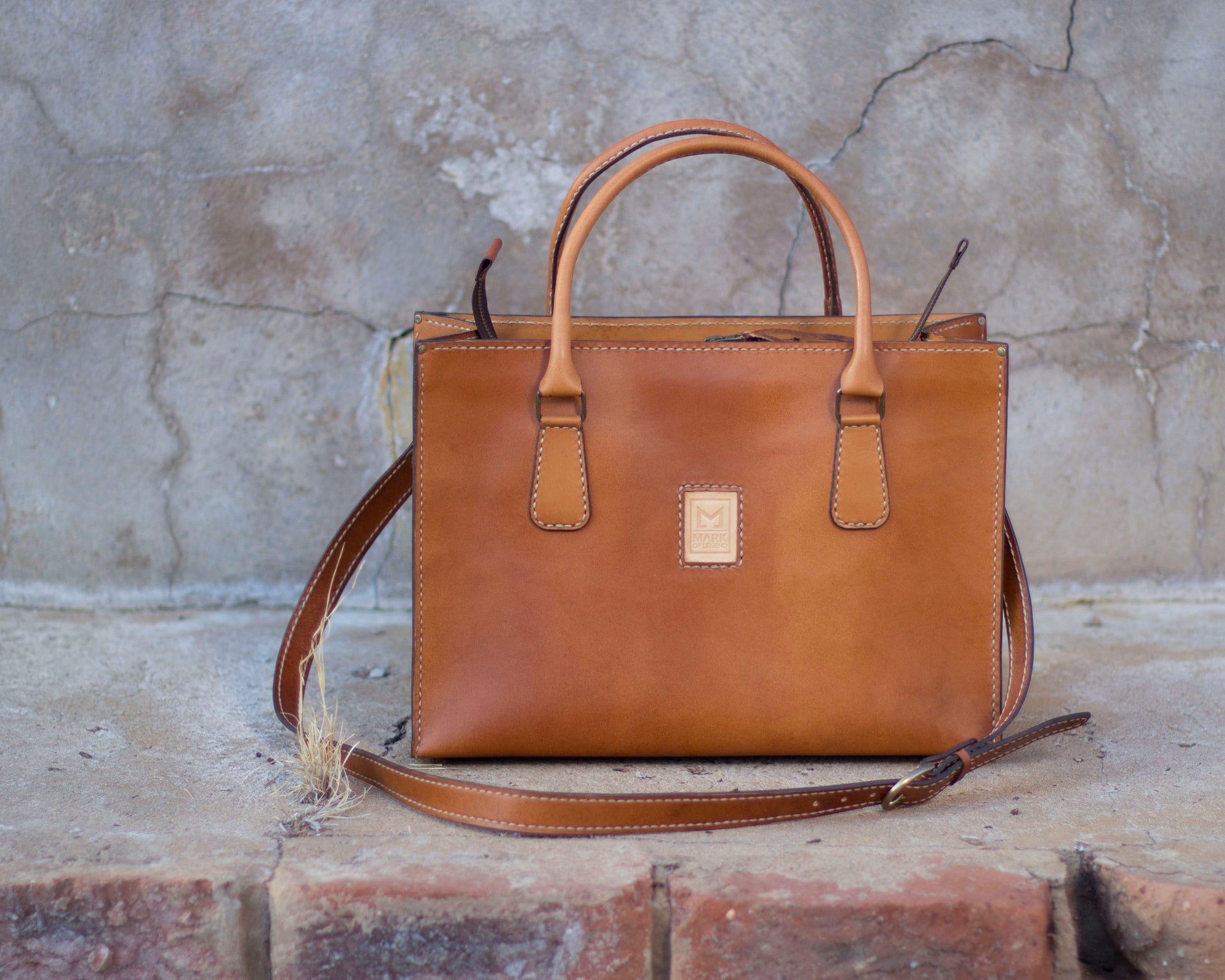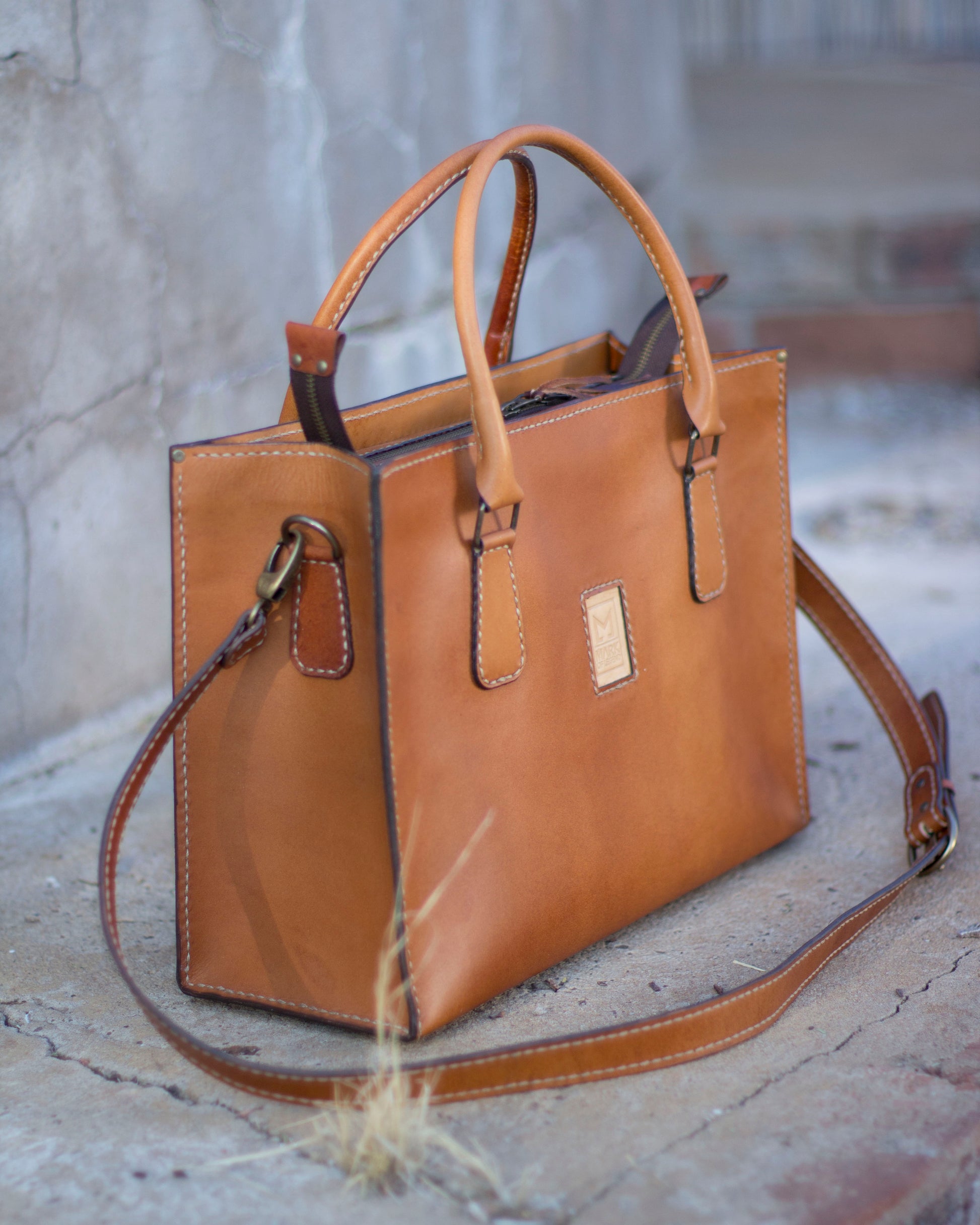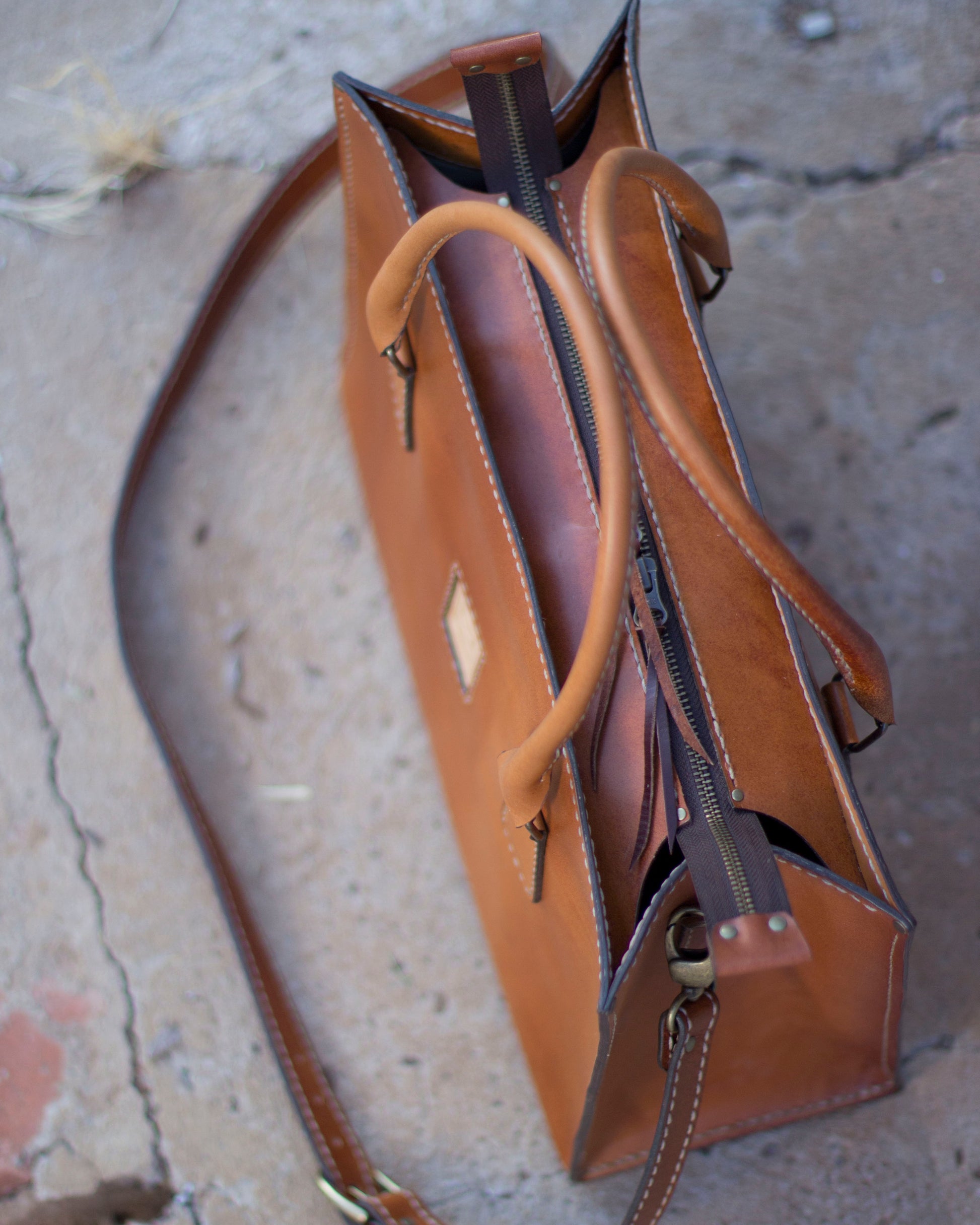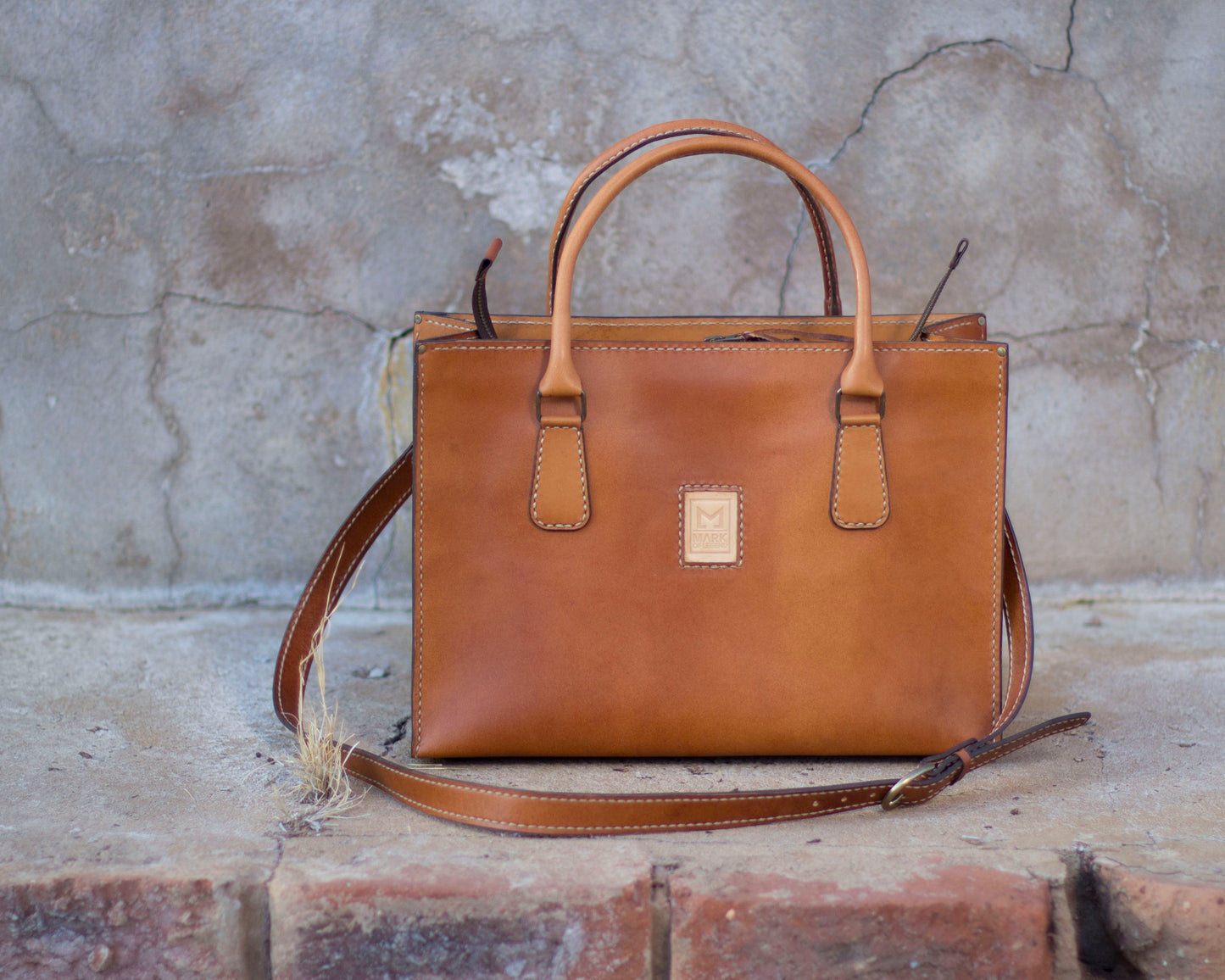
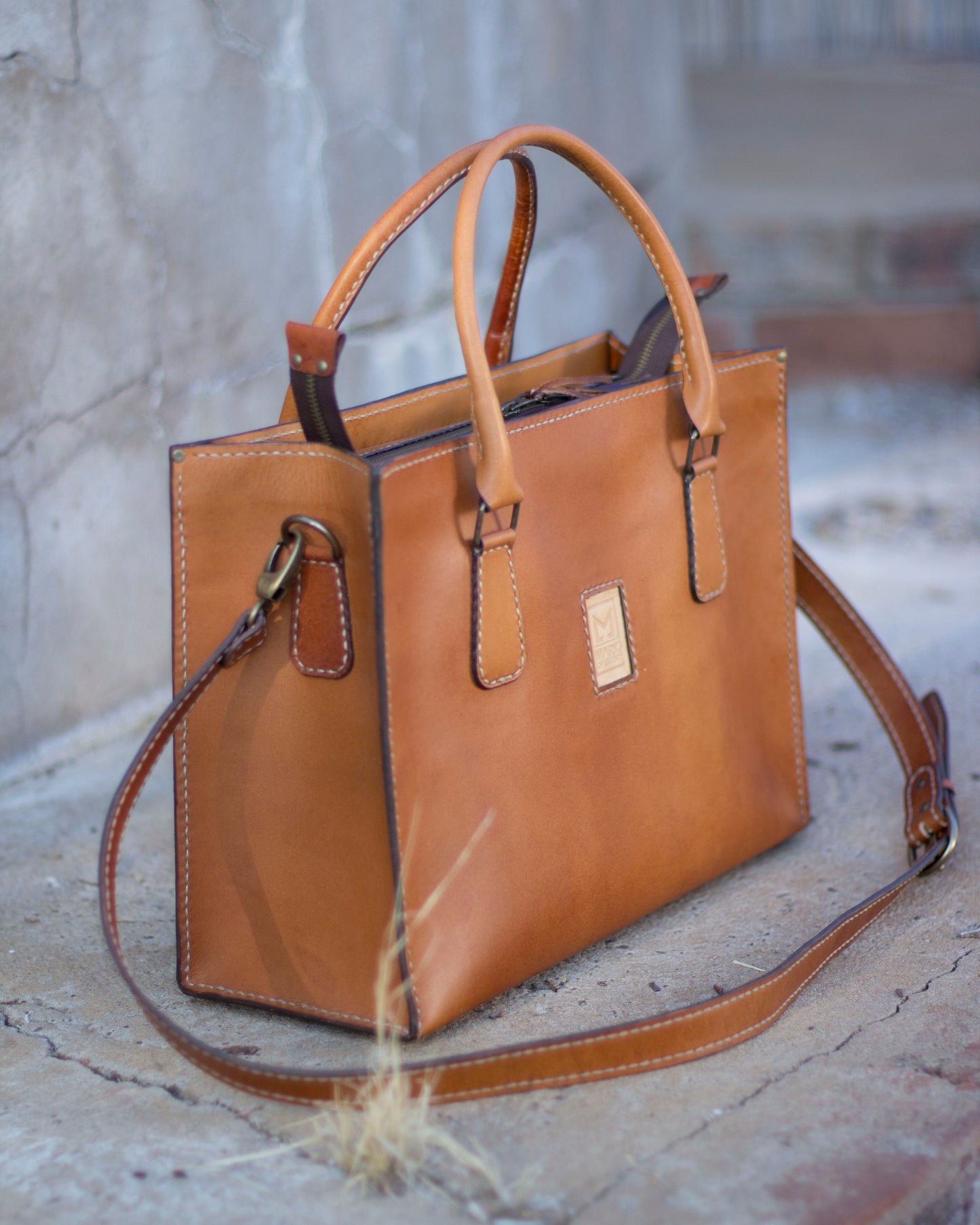
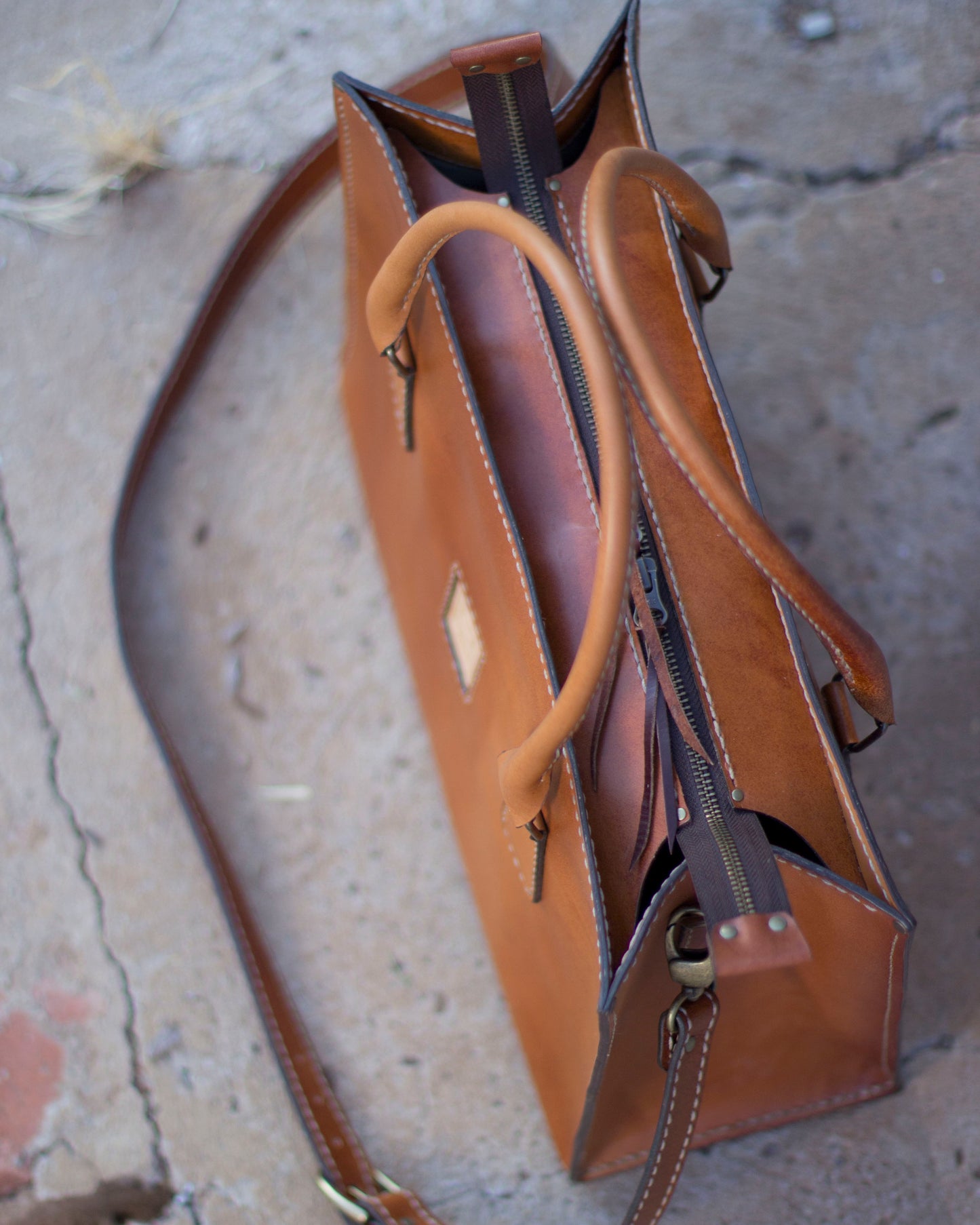
Features & FAQ
How to care for your leather
Understanding Your Leather: The Foundation of Proper Care
Why Leather Type Matters
Not all leather is created equal, and Mark of Legend's commitment to sustainably sourced, full-grain leather means your piece requires specific care based on its finish and tanning process. Full-grain leather—the highest quality available—retains the hide's natural grain and develops a rich patina over time, unlike corrected or bonded leathers that deteriorate with age.
Your Mark of Legend Leather Options:
Vegetable-Tanned Leathers (Veg Tan Brown, Veg Tan Chocolate, Tan)
These leathers use natural tannins from tree bark, making them environmentally friendly and highly durable. Vegetable-tanned leather starts lighter and darkens beautifully with sun exposure and handling, developing a unique patina that tells your story. This leather type is more absorbent initially and requires conditioning to build up natural oils.
Care priority: Regular conditioning, sun exposure management, water protection
Oil-Tanned and Pull-Up Leathers (Naku Butterscotch, Wild Horse Tobacco, Dark Brown)
These leathers are treated with oils and waxes during tanning, giving them natural water resistance and a soft, supple feel. When you press or bend these leathers, they "pull up" (lighten temporarily), showing their oil content. They're more forgiving for everyday use and require less frequent conditioning.
Care priority: Occasional conditioning, gentle cleaning, maintaining natural oils
The South African Context
South Africa's climate presents unique challenges: intense UV exposure, dry winters in the interior, humid coastal conditions, and dramatic temperature variations. Your leather care routine should account for your specific region—Johannesburg's dry highveld air requires more frequent conditioning than Cape Town's coastal humidity.Product-Specific Care Instructions
Vellies: Daily Wear, Daily Care
Vellies are your go-to footwear, often worn barefoot or with minimal socks, which means they absorb foot oils and moisture regularly. This actually benefits the leather, but requires specific maintenance.
Break-in Period (First 2-4 Weeks):
- Wear for short periods initially to allow leather to mold to your feet
- Apply a thin layer of leather conditioner before first wear to soften
- Expect slight color variation as natural oils from your feet interact with the leather
- Embrace the molding process—this is your vellie becoming uniquely yours
Weekly Maintenance:
- Remove loose dirt with a soft brush or dry cloth
- Allow vellies to air out for 24 hours between wears if possible
- Stuff with newspaper if they become wet to maintain shape and absorb moisture
- Rotate between pairs to extend lifespan
Monthly Deep Care:
- Clean with a damp (not wet) cloth and mild saddle soap if needed
- Apply leather conditioner sparingly—your foot oils provide natural conditioning
- For veg tan vellies, expect and embrace darkening, especially on footbeds
- Check stitching for any loose threads (hand-stitched pieces may need occasional tightening)
Seasonal Adjustments:
- Summer: Less conditioning needed due to foot perspiration; focus on UV protection
- Winter: More frequent conditioning as dry air draws out moisture; consider waterproofing spray for rainy days
Boots: Rugged Protection Meets Careful Maintenance
Boots endure more environmental stress than vellies—mud, rain, dust, and varied terrain—so they require more robust care while maintaining leather integrity.
Initial Treatment (Before First Wear):
- Apply a quality leather conditioner or boot oil to all surfaces
- Pay special attention to flex points (ankle, toe box) to prevent cracking
- For veg tan boots, consider a leather protector spray for water resistance
- Allow 24 hours for products to fully absorb before wearing
After Each Wear (or Weekly for Regular Use):
- Remove dirt and dust with a horsehair brush while leather is dry
- Wipe with a slightly damp cloth for stubborn dirt
- Allow boots to dry naturally away from direct heat (never near heaters or in direct sun)
- Use boot trees or stuff with newspaper to maintain shape
Monthly Intensive Care:
- Clean thoroughly with saddle soap and warm water
- Condition with mink oil, neatsfoot oil, or quality leather conditioner
- For oil-tanned leathers (Wild Horse Tobacco, Naku Butterscotch), use sparingly—they retain oils naturally
- For veg tan leathers, condition more generously as they're more absorbent
- Buff with a soft cloth to restore sheen
Waterproofing Strategy:
- Apply waterproofing treatment every 2-3 months for regular use
- Reapply after deep cleaning or if boots get soaked
- Beeswax-based products work excellently for South African conditions
- Test any new product on an inconspicuous area first
Handbags: Beauty Meets Daily Functionality
Handbags face unique challenges: constant handling, varied contents, exposure to cosmetics and spills, and frequent environmental transitions (car to office to outdoors).
Daily Habits:
- Empty your bag weekly and shake out debris
- Wipe handles and high-touch areas with a dry cloth to remove oils and dirt
- Avoid overstuffing—leather stretches permanently if stressed repeatedly
- Use bag organizers to prevent sharp objects from scratching interior leather
- Store upright or stuffed to maintain shape when not in use
Monthly Maintenance:
- Vacuum interior gently to remove dust and crumbs
- Wipe exterior with barely damp cloth, following leather grain
- Condition leather every 4-6 weeks, focusing on handles and stress points
- Check hardware (buckles, zippers, rivets) and tighten if needed
- Rotate bags if you own multiple pieces to reduce wear
Stain Prevention and Treatment:
- Address spills immediately—blot, never rub
- For oil stains, sprinkle cornstarch or talcum powder, leave overnight, brush off
- For water spots, dampen entire panel evenly and allow to dry naturally
- Ink stains: Try rubbing alcohol on a cotton swab (test first on hidden area)
- For veg tan bags, accept that patina development includes some marking—this is part of the leather's story
Storage Recommendations:
- Store in dust bag (or pillowcase) in cool, dry place
- Stuff with acid-free tissue paper to maintain shape
- Never store in plastic—leather needs to breathe
- Keep away from direct sunlight to prevent fading
- Store away from heat sources that dry out leather
Wallets and Small Accessories: Pocket-Sized Care
Wallets live in pockets and bags, experiencing constant friction, body heat, and handling. Despite their size, they require thoughtful maintenance.
Break-In and Daily Use:
- New wallets may feel stiff—this softens naturally with handling
- Avoid overstuffing with cards and receipts, which stretches card slots permanently
- Remove from back pocket when sitting to prevent warping
- The natural oils from your hands provide ongoing conditioning
Quarterly Maintenance:
- Empty completely and wipe interior and exterior with dry cloth
- Apply minimal leather conditioner—wallets receive natural oils from handling
- Check stitching, especially on card slots under stress
- For veg tan wallets, enjoy the darkening patina from pocket oils and handling
Special Considerations:
- Avoid exposing to water (remove from pockets before swimming, rain)
- Keep away from sharp objects that could scratch or puncture
- If wallet gets wet, dry flat with paper towel absorption, never heat
Seasonal and Environmental Care: Adapting to South African Conditions
Understanding Regional Variations
South Africa's diverse climate zones require different leather care approaches:
Highveld (Johannesburg, Pretoria):
- Challenge: Extremely dry winters, intense summer sun, low humidity
- Strategy: Increase conditioning frequency in winter (every 3-4 weeks), use UV protectant sprays, store leather away from direct sunlight
- Benefit: Low humidity prevents mold and mildew issues
Coastal Regions (Cape Town, Durban):
- Challenge: Higher humidity, salt air exposure, more rainfall
- Strategy: Focus on waterproofing, ensure thorough drying after exposure to moisture, store with silica gel packets to prevent mold
- Benefit: Natural humidity keeps leather supple with less conditioning needed
Interior and Karoo:
- Challenge: Extreme temperature variations, dust, very low humidity
- Strategy: Aggressive conditioning schedule, dust protection, temperature-stable storage
- Benefit: Dry conditions preserve leather if properly maintained
Seasonal Care Calendar
Autumn (March-May):
- Deep clean all leather goods after summer sun exposure
- Assess condition and repair any damage before winter
- Apply protective treatments before rainy season
- Condition thoroughly as temperatures drop
Winter (June-August):
- Increase conditioning frequency—dry air draws moisture from leather
- Waterproof boots and bags for rainy days
- Never dry wet leather near heaters or fires
- Store with care as indoor heating dries air further
Spring (September-November):
- Clean off winter grime and salt residue
- Refresh conditioning before summer heat
- Check for any mold or mildew from winter moisture
- Prepare lighter-colored leathers for sun exposure
Summer (December-February):
- Apply UV protection to prevent fading and drying
- Increase cleaning frequency due to dust and perspiration
- Allow leather to breathe—avoid prolonged storage in hot cars
- Embrace patina development on veg tan leathers
Troubleshooting Common Issues: Solutions for Real-World Problems
Scuffs and Scratches
Light Surface Scuffs:
- Rub gently with your finger—body heat and oils often diminish minor marks
- For oil-tanned leathers, the oils will naturally migrate to cover light scratches
- Buff with soft cloth in circular motions
- Apply small amount of conditioner and buff again
Deeper Scratches:
- Clean area thoroughly and let dry
- Apply leather conditioner or cream matching your leather color
- Work product into scratch with finger
- Buff with soft cloth
- Repeat applications over several days
- Accept that deep scratches become part of your piece's character
Water Damage and Stains
Fresh Water Exposure:
- Blot immediately with absorbent cloth—never rub
- Stuff item with newspaper or paper towels
- Allow to air dry naturally away from heat and sun
- Once completely dry (24-48 hours), condition thoroughly
- If water spots remain, dampen entire panel evenly to blend
Salt Water or Salt Residue:
- Wipe with cloth dampened in fresh water to remove salt
- Dry thoroughly and condition generously
- Salt draws moisture from leather, so multiple conditioning treatments may be needed
Mold and Mildew
Prevention:
- Store in cool, dry, ventilated space
- Use silica gel packets in storage bags
- Never store damp leather
- Ensure complete drying after cleaning
Treatment:
- Brush off visible mold outdoors (spores spread easily)
- Wipe with solution of equal parts water and white vinegar
- Dry completely in sun (UV kills mold spores)
- Condition thoroughly once dry
- Store with improved ventilation
Color Fading and Uneven Patina
For Veg Tan Leathers:
- Fading and color change is natural and desirable
- Uneven patina tells your usage story
- To even out: expose lighter areas to more sunlight gradually
- Embrace the unique character—no two pieces age identically
For Dyed Leathers:
- Some fading is normal with UV exposure
- Use UV protectant sprays to slow process
- Avoid prolonged direct sunlight exposure
- Leather-specific color creams can refresh appearance
Stiffness and Drying Out
Causes:
- Insufficient conditioning
- Exposure to heat or direct sun
- Water damage without proper reconditioning
- Age and neglect
Treatment:
- Apply generous amount of quality leather conditioner
- Allow to absorb fully (several hours or overnight)
- Repeat every few days until suppleness returns
- Work leather gently with hands to restore flexibility
- For severe cases, consider professional leather restoration
Odor Issues
General Odors:
- Air out in well-ventilated area for 24-48 hours
- Place baking soda inside bags or shoes overnight
- Stuff with newspaper to absorb moisture and odors
- Never use perfumes or harsh chemicals
Mildew Smell:
- Follow mold treatment protocol above
- Ensure complete drying
- Store with cedar blocks or lavender sachets
- Improve storage ventilation
Long-Term Preservation: Ensuring Your Lifetime Investment
Storage Best Practices
Short-Term Storage (Daily/Weekly):
- Store bags upright or properly stuffed to maintain shape
- Keep shoes and boots with shoe trees or stuffed with paper
- Ensure items are clean and dry before storing
- Avoid piling leather items on top of each other
- Store in cool, dry place away from direct sunlight
Long-Term Storage (Seasonal/Extended):
- Clean and condition thoroughly before storage
- Stuff items completely to prevent creasing and shape loss
- Wrap in breathable cotton dust bags or pillowcases (never plastic)
- Include silica gel packets to control moisture
- Store in climate-controlled environment if possible
- Check every 2-3 months and air out briefly
- Avoid attics (too hot) and basements (too humid)
Professional Care: When to Seek Expert Help
While regular home care maintains your Mark of Legend pieces beautifully, certain situations warrant professional attention:
- Deep stains that home treatments can't remove
- Structural damage (torn seams, separated soles, broken hardware)
- Extensive water or mold damage
- Color restoration for severely faded pieces
- Stretching or reshaping needs
- Annual professional cleaning for high-value pieces
Building Your Leather Care Kit
Essential items for maintaining Mark of Legend products:
Basic Kit (R300-500):
- Horsehair brush (soft and stiff bristles)
- Quality leather conditioner (mink oil or all-purpose)
- Saddle soap or leather cleaner
- Soft cotton cloths (old t-shirts work perfectly)
- Waterproofing spray
Advanced Kit (Additional R400-600):
- Leather-specific stain remover
- Color-matched leather cream
- Neatsfoot oil for intensive conditioning
- Leather protectant spray with UV protection
- Boot trees or shoe trees
- Suede brush (if you have suede accents)
The Patina Philosophy: Embracing Natural Aging
Mark of Legend's handmade pieces are designed to age beautifully, not to remain pristine. The patina—the natural darkening, softening, and character development—is not damage; it's the leather's story unfolding.
What to Expect:
- Veg tan leathers will darken significantly, especially with sun and handling
- High-touch areas (handles, edges) will develop rich, dark patina first
- Natural marks and variations will become more pronounced
- Leather will soften and mold to your usage patterns
- Color will deepen and become richer over years
What to Embrace:
- Small scratches and scuffs that tell
Shipping & Delivery
We offer Door-toDoor shipping, PUDO Locker-to_Locker and PostNet 2 Postnet.
FAQ
01. WHEN WILL I RECEIVE MY ORDER?
We generally operate on a first come first serve basis. As your order rolls in, it is placed on a list. As to when we begin processing your order and get it shipped, is based on how many orders we have received in the same time
frame and prior. We can only give estimates as to when you may
receive your order. Please note that production only starts once payment is received!
02. HOW DOES SHIPPING WORK?
Door to door: We can courier straight to your home or office anywhere in South Africa with The Courier Guy (2-4 days) R140.00.
PUDO Lockers: Let us know which PUDO locker will be convenient for you. R95
PostNet 2 Postnet: We can ship to any PostNet in South Africa. R140
03. ESTIMATED WAIT TIME
1-4 Weeks.
We build almost everything to your order in the order that they arrive.
05. TERMS FOR ORDERING
If for any reason you are NOT satisfied with the QUALITY of the product we are delivering, we will REPLACE your product if it is not a personalized item. The product will need to be in its original condition.
Please note that you are responsible for providing the correct information regarding the product you buy. Whether it is the correct leather belt measurement, bag measurement or vellie size and colour. You are
responsible for any additional shipping that occurs due to incorrectly placed orders. We will gladly exchange if a different size is required.
Please note we do not do any REFUNDS!
For questions about courier, sizing, leather types, and turnaround times, please contact us.
Thanks for buying independent and hand made.
ABOUT THE MAKE & MATERIAL
By purchasing handmade goods from Mark of Legend™ leather, you understand the nature of handmade goods as containing slight variations due to the
maker being human. As they say, it is the subtle imperfections of
handmade that makes it perfect.
By purchasing our leather goods
you are also stating that you understand that leather is an organic material, and therefore can show scars or other marks of the animal's life. These marks and variations are what makes leather a beautiful medium as every mark tells a story and gives your leather good a unique identifying mark. As craftsman, it is our desire to have our work speak
for itself. That being said, we spend the time required searching and hand selecting all our leather skins and hardware ourselves.
We generally operate on a first come first serve basis. As your order rolls in, it is placed on a list. As to when we begin processing your order and get it shipped, is based on how many orders we have received in the same time frame and prior.
We can only give estimates as to when you may receive your order. Please note that production only starts once payment is received!
02. HOW DOES SHIPPING WORK?
Door to door, We can courier straight to your home or office anywhere in South Africa with The Courier Guy (2-4 days) R140.00.
03. ESTIMATED WAIT TIME
2-4 Weeks.
We build most everything to your order in the order that they arrive.
04. BASIC LEATHER CARE
We recommend using the Mark Of Legend™ Leather Balm. It is a leather conditioner that is neutral in colour and won’t change the original colour of the leather.
Leather/Hide food like Plush Hide Food will also work well. A waxed based leather conditioner that is neutral in colour.
DUBBIN - a wax product used to soften, condition and waterproof leather and other materials. The orange coloured dubbin will darken the full-grain leather slightly.
05. TERMS FOR ORDERING
If for any reason you are NOT satisfied with the QUALITY of the product we are delivering, we will REPLACE your product if it is not a personalized item. The product will need to be in its original condition.
Please note that you are responsible for providing the correct information regarding the product you buy. Whether it is the correct leather belt measurement, bag measurement or vellie size and colour. You are responsible for any additional shipping that occurs due to incorrectly placed orders. We will gladly exchange if a different size is required.
Please note we do not do any REFUNDS!
For questions about courier, sizing, leather types, and turnaround times, please contact us.
Thanks for buying independent and hand made.
ABOUT THE MAKE & MATERIAL
By purchasing handmade goods from Mark of Legend™ leather, you understand the nature of handmade goods as containing slight variations due to the maker being human. As they say, it is the subtle imperfections of handmade that makes it perfect.
By purchasing our leather goods you are also stating that you understand that leather is an organic material, and therefore can show scars or other marks of the animal's life. These marks and variations are what makes leather a beautiful medium as every mark tells a story and gives your leather good a unique identifying mark. As craftsman, it is our desire to have our work speak for itself. That being said, we spend the time required searching and hand selecting all our leather skins and hardware ourselves.

